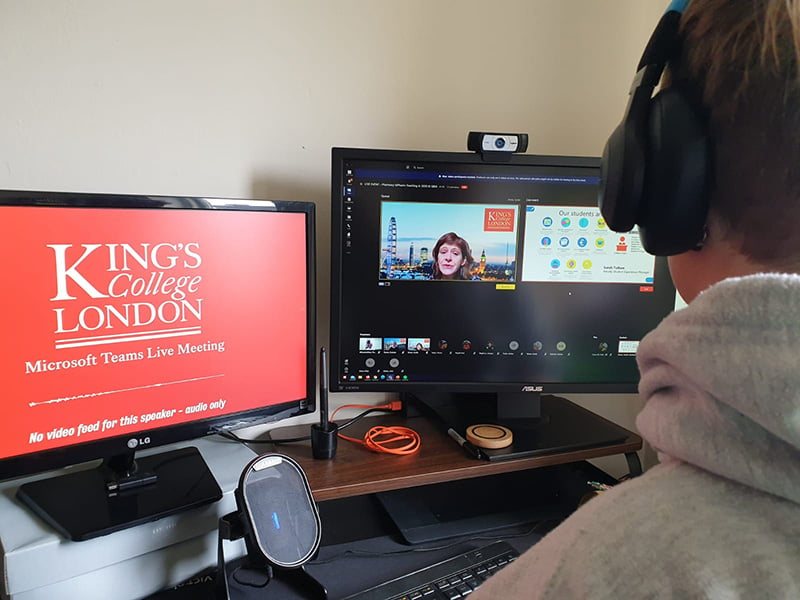The Next Normal: King’s College London Continues to Adapt Amid COVID-19 Pandemic

When it became apparent in March that closure of the campuses at King’s College London (KCL) was inevitable, we faced the challenge of how to make ourselves relevant in a world that was suddenly working remotely. Our role had always been about supporting people and equipment in physical spaces, but we knew we had the foundation of skills to be of use to the university now that everyone was relying on audio and video technologies to continue essential work from home. We needed to re-frame ourselves to the college community and fine tune our abilities to match this new situation.
One of the first things we started pulling together was a planner listing all the training that was becoming available as lockdown was imminent. The KCL AV team currently has 24 staff normally spread over 4 sites, and training was the one thing everyone could do from home instantly. It was also the thing that could be crucial to keeping us abreast of very rapid changes. Over a few weeks, the team attended webinars and undertook online training including several AVIXA® courses, manufacturer webinars, and some internal training as we began making connections across our own business. We reached out to the teams who look after the Virtual Learning Environment (VLE) and those who help train staff in using Microsoft Teams, so we could learn how to support both these areas. We also began simple edit tasks for existing lecture captures to make a better experience for students who had suddenly lost hours of in-person teaching.

At the beginning of April, we were asked to develop a service for Teams Live Events. There was a demand for a secure supported product that would allow the business to continue talking to large numbers of current and future students, staff, and the wider community including hospitals. We undertook a process of testing, establishing a booking system, workflow, and user guides, and we launched the service in just under three weeks. We supported 64 Teams Live Events in May, and 138 in June, all through a period of having 60% of the team furloughed. These remain in high demand as we look toward the beginning of a new academic year in September.

In the last month, work has begun on addressing the question of hybrid teaching: allowing for both students joining remotely and in-person for the same teaching session. For this, we are part of a larger group across IT, which includes our AV Solutions team and the Technology Enhanced Learning (TEL) team. Hybrid/Hyflex teaching comes with a world of considerations, problems, and challenges, not least that we need to have a technical solution in place in several university rooms by September. We are about to begin a pilot with our recommended design from which we will also be able to establish how we provide support for academics delivering this style of teaching.
Another way that our work is adapting is through working with the TEL in IT, so we have more direct collaboration with academic departments. The TEL team is in high demand preparing for the increase in online teaching, and the tasks involved suggested some crossover into our areas of expertise — as well as giving us the chance to expand our skills with the VLE. We are taking on some work to assist them at this unprecedented time, but also looking to the future to generate a more immediate relationship with the academic departments to help meet their needs. This is also a pilot for cross-team working within IT, which has great possibilities for closer relationships in the future.
AV is an area with such potential and now more than ever as people have become reliant on the exact things that we specialise in. Within our organisation we have tried to swiftly seize this opportunity by looking at the bigger picture of our knowledge and channelling it into new areas that support the university’s needs. It remains an ever-evolving situation, but one we hope we are in a good position to make the most of, as all we can do is be prepared for the challenge.
This article was written by Catherine Sharman, CTS. You can contact her at catherine.sharman@kcl.ac.uk.





